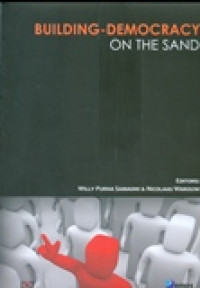
Text
Building-Democracy On The Sand
t is true that most political actors in Indonesia have adjusted to the existing rules and regulations within the procedures of democracy. But giving priority to the outcome and general habits (culture) is to neglect that the democratic infrastructure is far from sufficient. The alternative actors in particular are short of capacity to use and promote the means of democracy. Organised democracy and especially the system of representation is monopolised by the powerful elite. This collected essays, based on survey of democracy, suggests that Indonesia's democracy is held back. It is true that all people are allowed to vote, but women (who are not well connected), the poor and subordinated people are de-facto prevented from standing as candidates and sometimes even from voting, thus from trying to develop popular representation. Basic issues of equal civic rights and political equality thus present a similar challenges but also an opportunity as did the movements for the right to vote in the old democracies. Hence, the immediate need to develop well-organised and non-party-dominated political blocs-among others, is to foster independent popular influence within organised politics; to alter the current relations of power through more popular representation and participation; and to increase bargaining power to foster compromises that move towards rights-based sustainable development.
Availability
| KP XXI.000034 | KP XXI SAM b | My Library | Available |
| KP XXI 0027 | 321.8 Sam B | Perpustakaan Komnas Perempuan (Perpustakaan Komnas Perempuan) | Available |
Detail Information
- Series Title
-
-
- Call Number
-
321.8 Sam B
- Publisher
- Jakarta : Demos., 2009
- Collation
-
291 hlm; 22 cm
- Language
-
English
- ISBN/ISSN
-
978-979-17049-1-5
- Classification
-
321.8
- Content Type
-
-
- Media Type
-
-
- Carrier Type
-
-
- Edition
-
-
- Subject(s)
- Specific Detail Info
-
-
- Statement of Responsibility
-
-
Other version/related
No other version available
File Attachment
Comments
You must be logged in to post a comment
 Computer Science, Information & General Works
Computer Science, Information & General Works  Philosophy & Psychology
Philosophy & Psychology  Religion
Religion  Social Sciences
Social Sciences  Language
Language  Pure Science
Pure Science  Applied Sciences
Applied Sciences  Art & Recreation
Art & Recreation  Literature
Literature  History & Geography
History & Geography